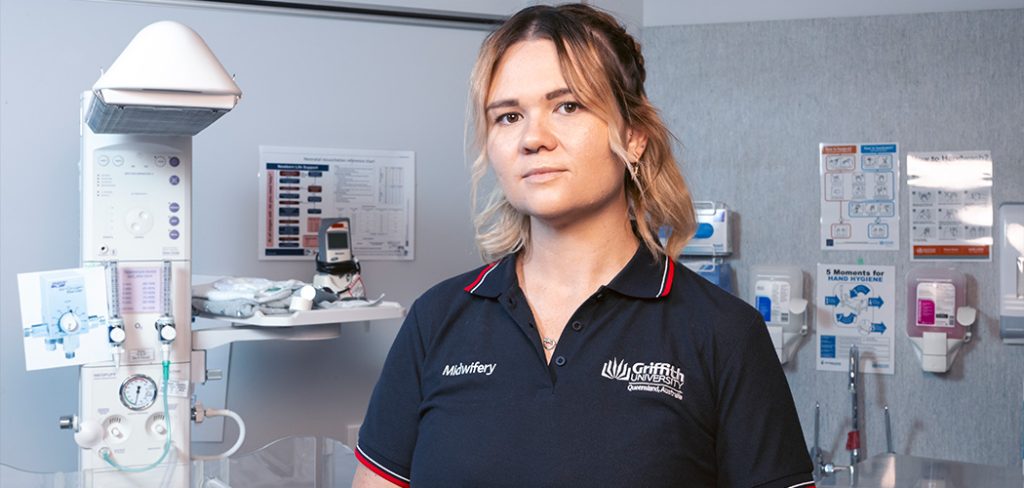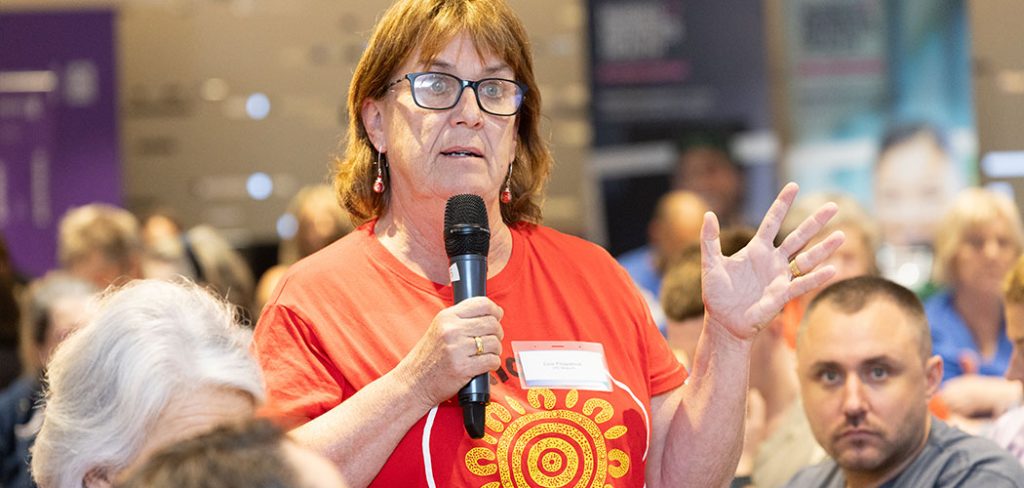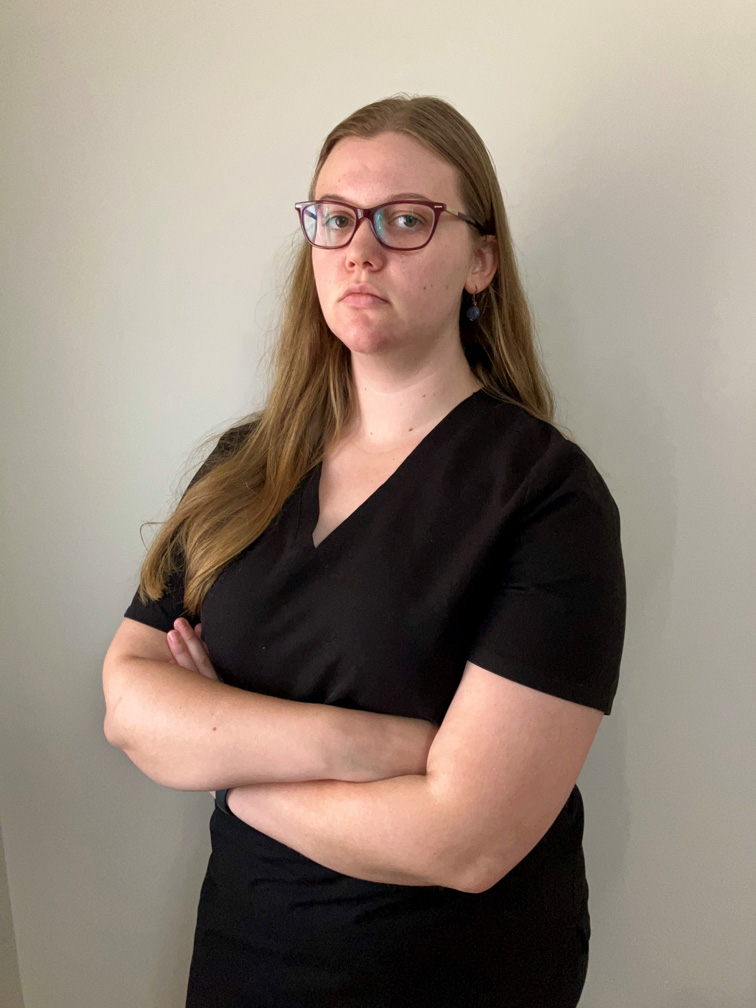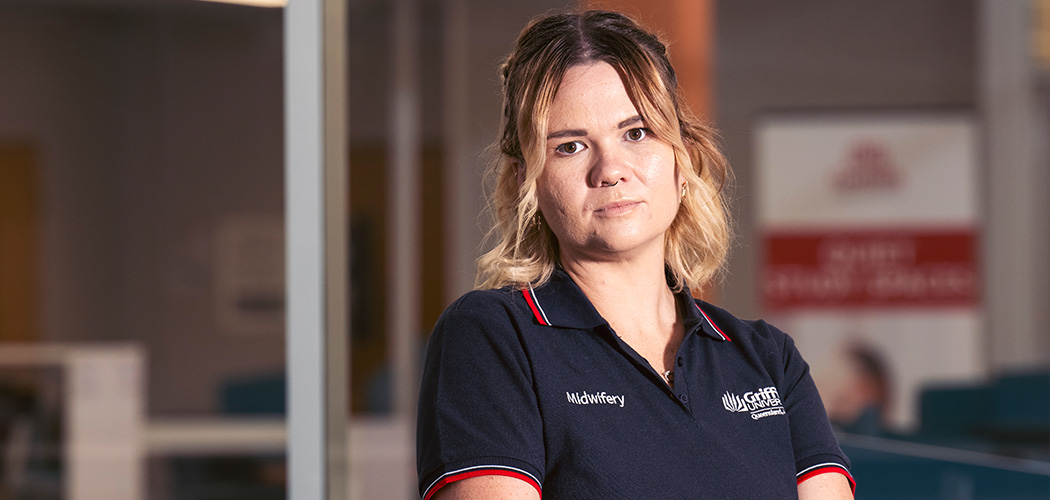A growing number of undergraduate nursing and midwifery students nationwide are voicing concerns about the significant challenges posed by hundreds of hours of mandatory unpaid clinical placements. Robert Fedele investigates.
Erin Pereira, a former banker turned aspiring midwife, found inspiration in the remarkable work of midwives during the birth of her first child.
Now in her final year of a Bachelor of Midwifery at Griffith University in Brisbane, she faces the financial challenges shared by many nursing and midwifery students across Australia due to mandatory unpaid clinical placements.
Undergraduate students are typically required to complete a minimum of 800 hours of unpaid clinical placements, and for those pursuing double degrees, it increases to over 1500 hours.
This year, Erin will clock up 400 clinical placement hours. Unlike many students who complete placements at numerous clinical settings, often at short notice, her posts remain fixed at the Toowoomba Hospital’s maternity unit, where she gains hands-on experience two to three days per week throughout the year. Additionally, Griffith midwifery students, including Erin, must undertake Continuity of Care Experiences (CoCEs), shadowing women during pregnancy, birth, and six weeks postpartum.
Living in Gatton, a rural town, it takes Erin about 40-minutes to drive to the Toowoomba Hospital. She estimates it has cost her about $9,000 each year to complete clinical placement hours. These costs include fuel, parking, uniforms, clinical tools, and food expenses. With two young children, childcare expenses amounting to $15,000 annually significantly contribute to her out-of-pocket costs.

To manage financially, Erin continues working part-time in banking. She acknowledges the crucial support of her partner, a truck driver, without which, she says, completing the degree would be nearly impossible.
“The attrition rate in midwifery is quite bad. A lot of students drop out, and I know a lot of it is due to the fact that it’s such an expensive degree to get through, with huge placement hours,” says Erin.
Erin believes nursing and midwifery students should be paid for clinical placements, suggesting that it would alleviate financial pressures, making it easier for them to complete their degrees and enter the workforce.
“Griffith sets us up so well in terms of our skills, but what we’re providing to the hospital is, essentially, just unpaid labour,” she says.
POVERTY ON PLACEMENT
The financial and social impacts of lengthy, mandatory, unpaid clinical placements for undergraduate nursing and midwifery students are increasingly evident.
A 2021 study, titled The Financial Challenges for Australian Nursing Students attending placement-based work-integrated learning, surveyed 2,359 nursing students from nine universities.
The study revealed that 79% of participants faced financial hardship due to unpaid clinical placements, with 65% unable to work during placements. Common barriers included travel costs, lack of affordable accommodation, childcare expenses, and lost wages.
‘I had to drive 400km round trip most days, as it cost too much for accommodation’, said one student.
Participants employed various strategies to cut costs, such as choosing placement locations with low or no-cost parking, or where they could stay with family/friends. Students often parked “far away from the hospital so that I would not have to pay parking, this was a typically a 20-minute walk and very risky at night”.
The study also highlighted students’ perceived lack of university support, particularly in finding accommodation. Researchers noted that some international jurisdictions provide nonrepayable bursaries or scholarships to assist students financially.
A more recent “Poverty on Placement” survey conducted by Griffith University’s Student Representative Council (SRC) and Postgraduate Student Association (GUPSA) uncovered similar findings.
Despite recognising the benefits of clinical placements, 95% reported a major drawback: a significant impact on financial wellbeing. Almost all respondents (97%) experienced a loss of regular income during unpaid placements, and nearly half reported complete loss of income, impacting their ability to pay rent and bills. Expenses, including fuel, parking, tolls, and childcare, increased for 80% of students during placements. Other barriers reported included lack of placement flexibility, inadequate university support, and inconsistent placement quality.
Close to one-third of respondents had to relocate for placements, which, for one student, involved paying $2,000 in accommodation alone.
“I know people living out of cars or in tents because they cannot afford rent. Then we’re being told to finish our degree, we need to complete 1,000 hours of placement, approximately six months of unpaid work”, one respondent said.
Meanwhile, 93% of respondents reported that unpaid placements were detrimental to their stress levels, with 81% saying it affected their mental health, 76% sleep, and 66% general health and wellbeing.
Tellingly, over 99% of students supported paid placements and/or financial support to address poverty, wellbeing, and attrition rates. Calling for urgent reform, the report, led by Dorinda Harvey-Bravo, urged universities and governments to significantly increase their support for students required to undertake placements.
La Trobe University’s Student Union (LTSU) released a study last year, Student Placement Poverty, reflecting similar challenges.
Key findings indicated that 52% of students struggled to pay for rent, food, bills and medicines during placement, while 16% faced accommodation issues. Nearly a third of students said they weren’t given enough notice regarding their clinical placement location and roster, with 10% handed less than a week to make arrangements.
La Trobe’s students also called for fully-funded placements, like other jobs, a minimum of eight weeks’ notice for placements, and not being required to travel more than one hour from their homes to complete placement. They also recommended improved communication and support, including an orientation pack with key information to enhance students’ preparedness.
CALLS FOR GOVERNMENT ACTION
Professor Karen Strickland, Executive Dean of Nursing and Midwifery at Edith Cowan University in Western Australia and Chair of the Council of Deans of Nursing and Midwifery (Australian & New Zealand) says universities have been engaging with both state and federal governments to address these pressing issues faced by students.
In its submission to the ongoing Australian Universities Accord, a government funded review aimed at transformative reform in the higher education system, CDNM outlined its vision for the future of placement arrangements and work-integrated learning (WIL).
The council highlighted the prevalent issue of ‘placement poverty’ experienced by a significant number of nursing and midwifery students while on WIL, particularly when the placement is situated away from their homes.
“Students then not only cannot earn but have the added expenses of travel, accommodation, and subsistence while simultaneously maintaining their home expenses. There are few scholarships available to support non-medical students,” CDNM explained.
CDNM’s recommendations included the introduction of WIL bursaries/scholarships for nursing and midwifery students, such as Austudy while on placement, with additional support for those undertaking WIL in rural/remote locations and for rural students undertaking a metropolitan placement.
Professor Strickland cites similar successful overseas models, such as those in Scotland, where students receive about $20,000 annually, non-means tested, and additional support for placement-related costs. She expressed confidence in the government’s commitment to addressing the issue, evidenced by its inclusion in the Australian Universities Accord Interim Report released last July. The Interim Report states that without resolving challenges students face due to placements, “initiatives to boost the number of students entering the system in critical health workforce areas will fail”.
In response to the need to ease student pressures, the Interim Report committed to exploring the possibility of financial support for students during mandatory placements.
“The Review considers there is merit in exploring the development of principles and standards for some level of support or stipend for students undertaking mandatory placements – with particular urgency for teachers and nurses,” the Interim Report stated.

Professor Strickland stressed CDNM is advocating for a bursary/stipend to support students, as opposed to ‘paid clinical placements’, to protect students’ status as learners and prevent them from being perceived as mere employees or apprentices, and treated as just another “pair of hands”.
“We want to preserve students’ right to learn while they’re on placement and not be seen as part of the workforce so that they are there to learn and work with the registered nurse.”
Further, Professor Strickland says CDNM is not solely focused on financial barriers but is actively addressing challenges related to preceptorship for students. This includes tackling issues like inconsistent quality and many students feeling like a burden on time-strapped clinicians. CDNM plans to launch a national preceptorship course this year to enhance the understanding and benefits of preceptorship.
ANMF RALLIES FOR CHANGE
At the ANMF’s 16th Biennial National Conference in October, delegates from across the country passed a motion calling on the ANMF (Federal Office) to lobby both federal and state governments to support the future nursing and midwifery workforce by securing funding for mandatory clinical placements integral to their courses.
The ANMF’s Strategic Lead Workforce & Federal Professional Officer, Jane Douglas, says students face escalating challenges due to the current clinical placement system.
“One of the biggest issues is that students are dropping out because they can’t afford to finish their clinical placements,” she says.
“Many can’t get to clinical placements. They’re told they’re going to a certain place the week before, which might be hours away. So, they have to try and find accommodation at short notice.
In December, the ANMF made a submission to the Australian Government’s National Nursing Workforce Strategy, emphasising the pivotal role of clinical placement reform in addressing recruitment and retention challenges. The submission highlighted various issues, including gaps in collaboration between education providers and healthcare settings, limited on-site support, inflexible rostering, and the absence of a consistent educational program for aspiring clinical facilitators.

“Significant work is required to help the clinical placement experience function and ensure students have access to fiscally supported learning so they can afford to attend,” the ANMF argued.
Ms Douglas says securing federal government funding for nursing and midwifery students undertaking mandatory clinical placements remains crucial. By alleviating financial burdens, more students will persist and successfully complete their courses.
WHERE IS THE JUSTICE FOR STUDENTS?
La Trobe University graduate Catherine Shearwood recently completed her ‘demanding’ four-year Bachelor of Nursing/Midwifery degree, encompassing more than 1,800 hours of mandatory unpaid clinical placements.
The 22-year-old, who has secured a graduate midwife position at a major Melbourne hospital, starting in May, admits that had she been aware of the challenges and sacrifices related to the course, she might have reconsidered enrolling.
Financial struggles were a constant companion throughout her degree, forcing her to make tough choices, such as deciding between buying lunch or reloading her Myki card. Car parking fees presented a major hurdle, forcing her to resort to parking at train stations and unsafe locations, due to the fact she “simply couldn’t afford it”.
To get by, Catherine worked at Woolies for half her degree. In her third year, she took on a role as a Registered Undergraduate Student of Midwifery (RUSOM).
“Even though this [midwifery] is a job that I love and want to do for the rest of my life, the training was absolutely unbearable while trying to stay afloat financially,” she reveals.
Looking back, Catherine feels grateful that as her finances dwindled, her parents stepped in to cover her grocery bills and essential medications. Midway through her degree, she also sold her car to cut down on fuel and on-road costs.
As a midwifery student, Catherine also had to follow 10 pregnancies from start to finish, on top of 1,800 hours of placements and university classes/study, meaning for fours years straight, she was unable to achieve a healthy work/life balance.
It meant missing out on socialising with friends and family due to the relentless demands of the degree, exacerbated by what she considers a lack of practical support from the university and clinical placement providers.

“When I wasn’t at placement, work or uni, I was going to appointments and using what should’ve been my holidays and personal time to attend appointments and births,” she says.
“During one placement, I spent a total of 18 hours across two days at two different hospitals attending births on my days off, meaning I did 7-8 days in a row, all completely unpaid.”
Despite her struggles, Catherine expresses optimism about the ANMF’s national push for paid clinical placements. She hopes that reforms to the system will make it more viable for the next generation of nurses and midwives.
“It makes me angry that tradies and other professions are paid for their internships, their apprenticeships. Why isn’t the same done for us,” asks Catherine.
“If they want to entice new nurses and midwives into the professions, they need to make the training worthwhile.”









16 Responses
I started my bachelor in 2012 and finished in 2017.
2014 – 2017 I went part time, it was only because I couldn’t do prac, I couldn’t afford to run a family household, work nightshift as an AIN and study. It was a crazy hard time. I don’t know how I found the strength and resources to complete my studies as a single mum with only my old nan to help me with food and a place to stay while my kids lived with their dad.
I knew it was for a better life for my family and now I have security because of the sacrifices I made. I’m very protective of my degree and work ethic because I know how hard it is.
Supplemental payments play a crucial role in supporting students engaged in mandatory clinical placements, offering a myriad of benefits that extend beyond financial assistance. By alleviating the burden of expenses associated with transportation, accommodation, and meals during clinical rotations, these payments not only reduce financial strain but also foster increased access to valuable learning opportunities for students from diverse backgrounds. Moreover, by allowing students to focus more intently on their clinical duties and educational objectives, supplemental payments contribute to enhanced performance and outcomes. The provision of financial support underscores institutional commitment to student success, leading to higher satisfaction levels and improved retention rates within the program. Ultimately, supplemental payments uphold principles of equity and fairness by ensuring that all students, regardless of their financial circumstances, have equal access to essential clinical training experiences. Education providers face multiple responsibilities preparing the future workforce to be safe critical thinking healthcare professionals, the introduction of supplemental payments has the potential to be a game changer.
How about bring back “in hospital training for those nurses that have already completed their enrolled nurse diploma and hold an AHPRA registration”. We are continually encouraged to “upskill” which is all well and good but there are barriers….. family life, already having work commitments and ongoing EFT at your current work place & financial burden, which for the most of us is an everyday struggle!
I do not understand why Uni cannot be 2 days a week and placement being undertaken at our own workplace. Most work places these days have experienced nurses, multiple departments and hands on clinical training out ways writing essays to tick a box! We have such a short fall of nurses but yet we, already qualified enrolled nurses are always over looked, regardless of skills, areas of work and how long we have been in the health industry. Enough is enough AHPRA, look into this before nursing shortage gets to the point where there will no longer be “Safe patient care”!
I had to stay with strangers to be able to fulfill my city placement of 8 weeks. That’s 8 weeks of unpaid placement in the city away from my home so working was not possible. I am thankful for my partner at the time for being able to use his holiday leave so he could stay home with our son and so we could pay the bills.
I ultimately became a nurse to get to my dream of becoming a midwife. I studied my EN’s then on graduation a few days later started my degree for Batchelor of nursing. after graduating I worked as well as starting midwifery. I soon learnt that as a single mum and the hours required on placement with midwifery that I would never be able to support my children and myself. So ultimately have had to give up my dream to be a midwife after a long road of study to get there. It’s bitterly disappointing the way it set up and has set a lot of people up to have to drop out. There is a want there for people to achieve these roles but we are ultimately being made to choose between survival and success. If you want to increase the workforce in both nursing and midwifery this has to change.
I’ve just finished my Diploma of Nursing. We had to do 400 hours and that was hard enough. I would love to go in and do my RN bachelor degree but I can’t afford to do 800+ hours of unpaid placement. Unpaid placement is stopping me from advancing my pathway.
Missing out on my paid employment to attend 1840 hrs (46 weeks) of unpaid placement as a double Nursing/Midwifery student. Following a minimum of 10 women’s pregnancies attending hrs and hrs of appointments + being on call and the long hrs spent at births. Add to that cost of fuel, parking, child care, uniform, vaccinations, equipment, mask fit testing, police checks etc and at the end of this a huge HECS debt. It’s a recipe for disaster both financially and mentally. On top of that late notice of shifts. I did not receive my roster for my current placement until the first day! Although this is the work I am passionate in doing and it is so rewarding the burn out before we even graduate is real! What a disgrace!
Unpaid placements have been an issue with Nursing and Midwifery degrees for over 30 years. A generous allowance to cover the costs associated with mandatory placements and to compensate for work hours lost would make a huge difference to students’ financial and emotional well-being and allow them to complete their degrees within a reasonable time frame.
I’m a single/sole mother of 1, studying part time to become an RN. Next year I’ll need to do 2 x 3 weeks (40 hour weeks) of placement. You don’t get to choose shift times. That is 6 weeks where I’ll need someone to give up their time to work around the shifts I get given to care for my 5 year old, and most likely will have to fork out substantial funds because of the shift work times. Not only that but you don’t even get assigned to a facility until 6 weeks prior, and don’t always get your shifts until closer to the start date. Not only do I have to cover normal expenses like mortgage, food etc but additional expenses of travel, parking etc.
It’s not also that we can’t work, we’re not allowed to work whilst on placement. If we’re already on placement for 42hours a week, that’s already basically over full time hours and therefore the uni says that we are a liability if we complete paid work to get by. But placement 42+ hours unpaid a week and trying to fit in paid work would be exhausting and we’d burn out.
Real training begins when you are working in a hospital or medical setting. Bring back paid internships for nurses. I am an EN studying the Degree now and it’s so valuable to be working and implementing what I learn straight away. I have to prolong the degree over 4 years so I can afford to do the placements.
And I work 7 days a week to afford the 600 hours of unpaid labour. It is that- student nurses are valuable hands on the ward.
Im all for helping nursing students financially when on placement as I’ve been there myself, but as a nurse who has nursing students regularly my question is how will this be run? Already we see that preceptor to student ratios are very high and if you’re lucky the preceptor will see the student for 5 minutes on the shift. There are some amazing students who are there and want to learn and get involved with all aspects of patient care but unfortunately there are some who just want to spend their time on the computer. Who is responsible to ensure these students are working if they are getting paid, and what defines “work”. Is it just another burden that will fall to the ward nurse? There needs to be an overhaul of the student placement system and a return to more preceptors so they can actually come to the ward and be hands on with the students and see where they are at in terms of skills and education. I cannot tell you the last time a preceptor did a medication round with a student nurse and it is scary some third year nursing students don’t know basic medications. Over the past ten years the system has fallen apart. Nursing students pay to study their degrees and the university takes their money and has an obligation to teach them the skills. This includes when on placement and there needs to be appropriate student preceptor ratios in place to facilitate the students learning.
I have been in the same position some years ago doing my Diploma of Nursing and had to leave it a few years to do my Bachelor of Nursing only starting this year at the age of 54 due to financial reasons and family as I eeded to work full time. I remember doing my placements and there were other students that had minimal food with them due to the cost of travel etc so we all shared our lunches and stories of struggling to do placement.
I am a current undergraduate Bachelor of Nursing student ,and I am also an enrolled Nurse .
I am hoping to complete my degree by this years end.
I have had to cut my FTE in my current role to accommodate completing studys
I have had to Take 16 weeks leave without pay this year for mandatory placements.
I’m unable to take on any extra work as I need what time I do have for assignments/ exams and PEP
Plus days on campus which is a 2hr return trip.
Text books are expensive
Mandatory uniforms expensive
Vaccinations expensive
Police checks expensive
Mandatory BLS AND mental health training a compulsory cost expensive
I have children and struggle with childcare as well as the impact of loss of wages .
I personally skip meals and survive on cups of free tea / coffee , so that my bills get paid and my kids don’t miss out on what they need and require .
I am sacrificing a lot to upgrade
I do not qualify for any Government support
I believe paid clinical placements would benefit all students
Why can’t we seriously go back to
In-Hospital training with a paid wage and study/ exams days in consultation with University’s
It would entice more to do the degree and recruit , retain and respect future , current and prospective Nursing and Midwifery students and Graduates.
Sonography student here – 2000 hours of unpaid clinical placement.
Currently in my second last block (20 weeks, 5 days/week). On top of the 40 hours/week I also to complete assessments and coursework. Every day I am on the bring of tears from fatigue, financial stress and complete lack of support from the university, my placement and the government. No government support as apparently this is not ‘full time’. Seems pretty contradictory that the heath of the healthcare students is in ruins as a result of unpaid placements.
I am angry and I am exhausted, and something has to change.
Not sure what to do at the moment, done six unit of my bachelor of nursing and struggling financially. The costs are crazy and university, government etc doesn’t really support you with it. I’m almost 30, marriage with a young daughter the cost of daycare to study are crazy and with no daycare on weekend how do I work in-between or around it all. Can we get weekend child care?
Also the cost of getting everything ready to go placement crazy from blood test, doctors appointments, vaccinations, uniform, books, textbooks etc. I can’t do the degree part time, they said so working around studying feels impossible for this mum. The placement hours are crazy and are full time. like at end of degree 8 weeks full time like what do I do with my child in that time. I can’t really ask my husband to have 8 weeks off work and child care won’t have a spot full time for an odd 8 weeks.